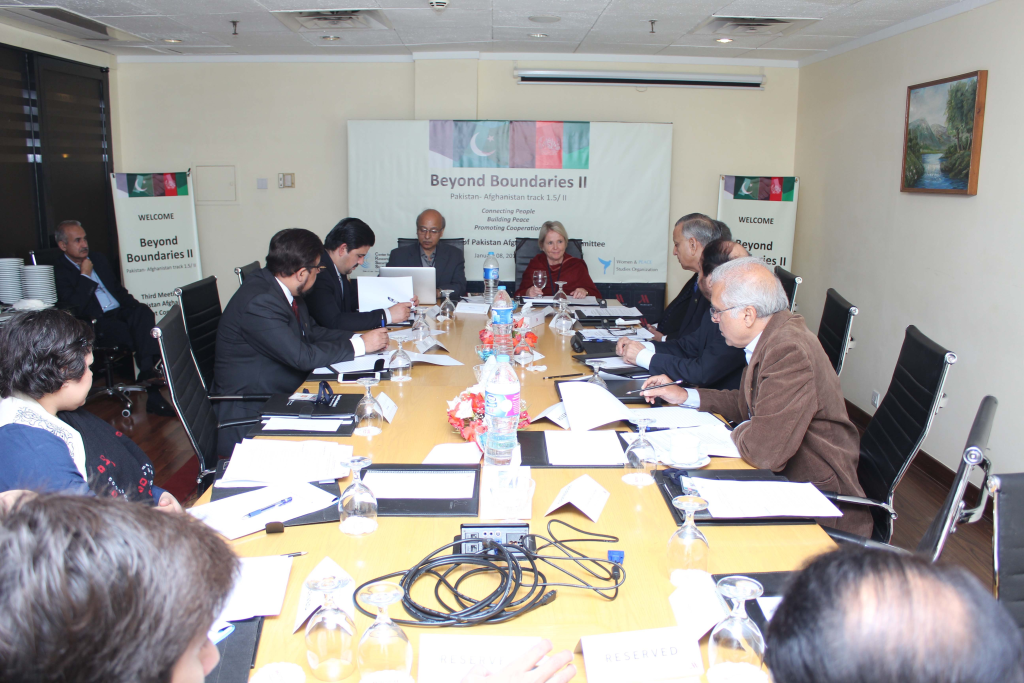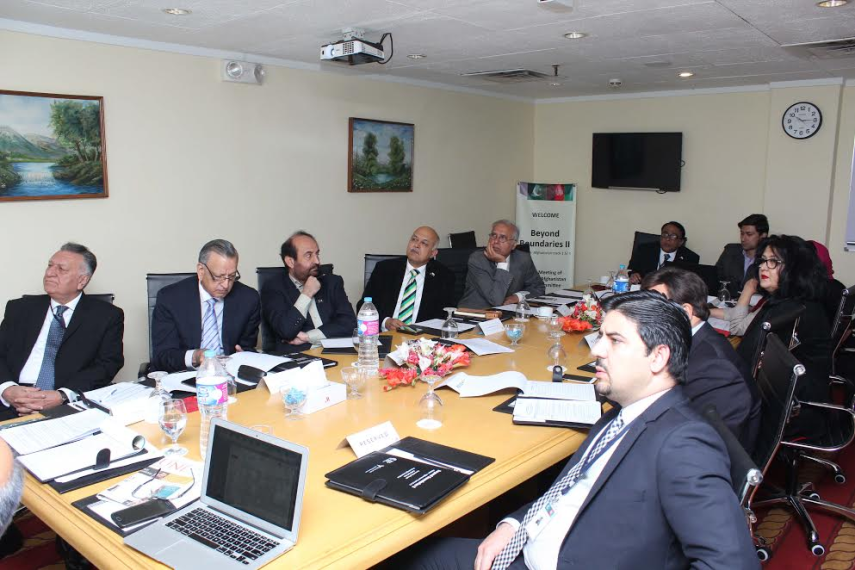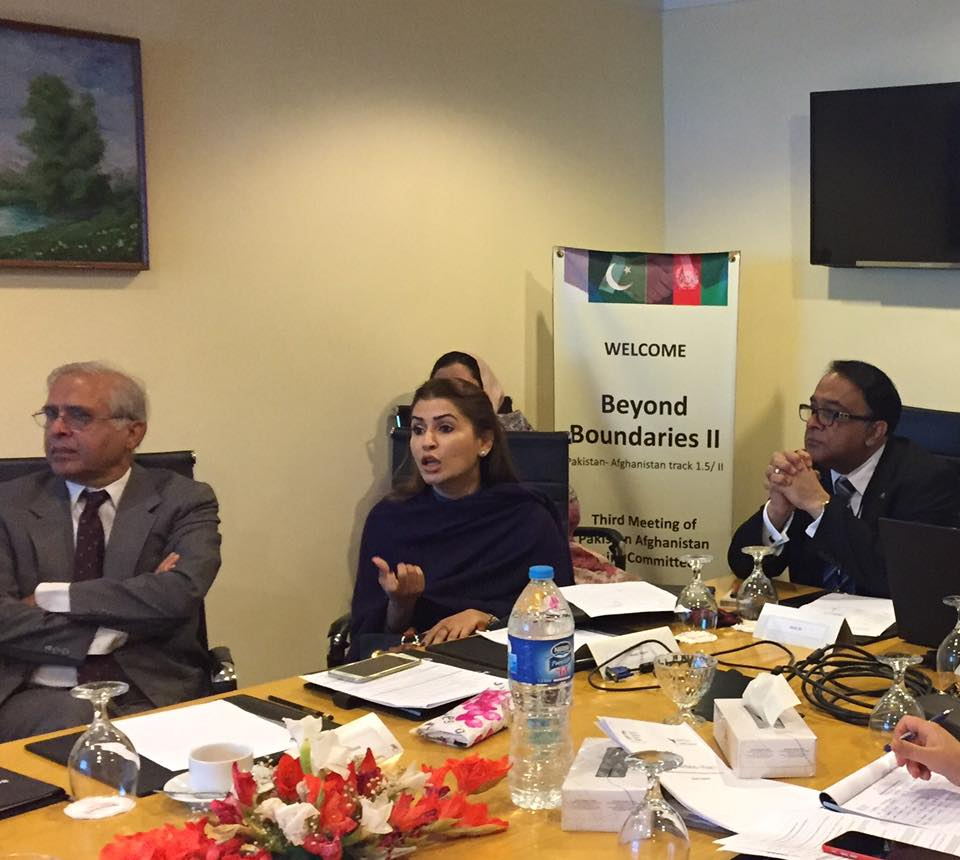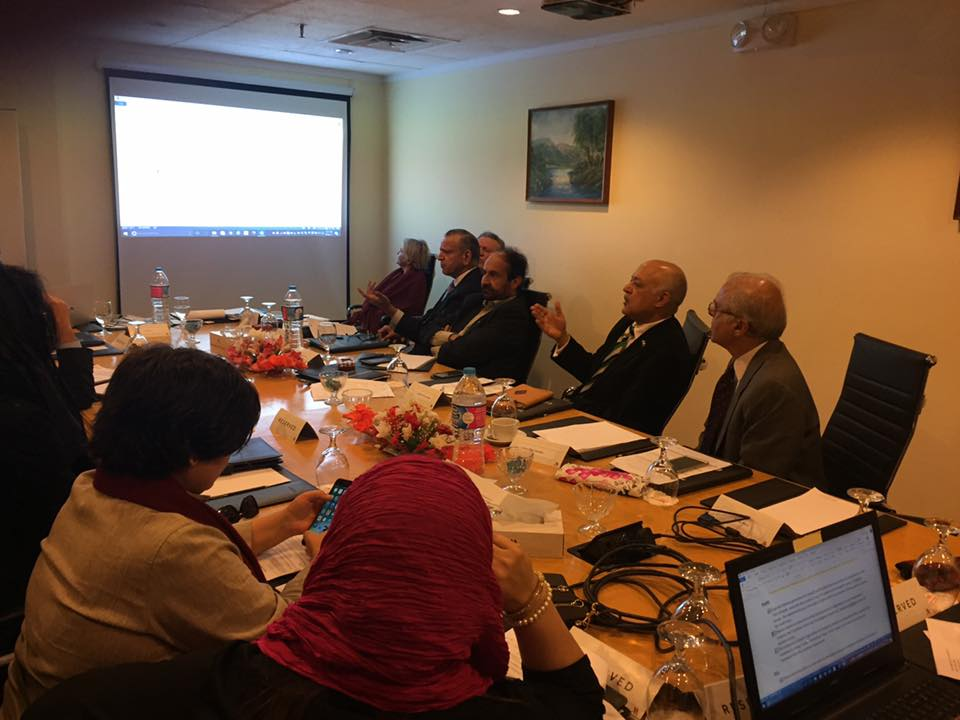The third meeting of the CRSS-WPSO Pak-Afghan track 1.5/II project Beyond Boundaries phase II Pakistan Afghanistan Joint Committee (PAJC) groups was held in Karachi, from 07 to 12 January, 2017.
The Pakistan Delegation included Ms. Shazia Marri, Member of National Assembly; Dr. Shoaib Suddle, former Inspector General of Police and Director General Intelligence Bureau; Lt. Gen. (retd) Asif Yasin Malik, former Defence Secretary; Mr. Mian Sanaullah, former Ambassador; Mr. Muhammad Tahir, Senior Journalist; and Mr. Qazi Humayun, former Ambassador.
While, the Afghan Delegation comprised Mr. Mozammil Shinwari, former Deputy Minister for Trade and Commerce; Ms. Wazhma Frogh, Advisor to Ministry of Defence; Ms. Elay Ershad, Member of Parliament; Mr. Khalid Pashtoon, Member of Parliament; and Ms. Asila Wardak, former Diplomat with Ministry of Foreign Affairs.
The PAJC groups had a full day discussion on 08 January, 2017. The four sessions during the day long discussions included: review of 2nd policy recommendations from Mazar-e-Sharif; Pak-Afghan Bilateral/Transit Trade Relations- Bottlenecks, Solutions and the Way Forward; Security and Peace; Opportunities for Cooperation in Media, Sports, Education, and Arts and Culture; and formulation of Joint Declaration of Policy recommendations. Ms. Anne Wilkens, former ambassador of Sweden to Pakistan and Afghanistan, chaired all the sessions as neutral international regional expert. The Afghan delegates welcomed Pakistan government’s decision to extend the period of stay for Afghan refugees. They said tackling trust deficit and to improve security situation between Pakistan and Afghanistan is crucial, noting that the momentum to make terrorist outfits weaker in Pakistan is increasing. Both the delegations felt that Pakistan and Afghanistan should focus on improving the bilateral trade. Other major deliberations included that media can play a critical role in improving public perceptions on both sides; the blame-game is the core issue between the two countries and it must be solved; border management is extremely important to ensure to and fro movement of goods and people between the two countries; and also to monitor terrorists’ movement across the two countries through porous border. The two groups agreed that the bilateral issues should be solved in a more holistic manner. There should not be standstill on bilateral relations. The two countries should cooperate in the fields of security, sports, media, education, arts, and culture for peaceful future. Both countries need to build on the commonalities such as religion, cultural values, food, music, language etc.
The Afghan delegates welcomed Pakistan government’s decision to extend the period of stay for Afghan refugees. They said tackling trust deficit and to improve security situation between Pakistan and Afghanistan is crucial, noting that the momentum to make terrorist outfits weaker in Pakistan is increasing. Both the delegations felt that Pakistan and Afghanistan should focus on improving the bilateral trade. Other major deliberations included that media can play a critical role in improving public perceptions on both sides; the blame-game is the core issue between the two countries and it must be solved; border management is extremely important to ensure to and fro movement of goods and people between the two countries; and also to monitor terrorists’ movement across the two countries through porous border. The two groups agreed that the bilateral issues should be solved in a more holistic manner. There should not be standstill on bilateral relations. The two countries should cooperate in the fields of security, sports, media, education, arts, and culture for peaceful future. Both countries need to build on the commonalities such as religion, cultural values, food, music, language etc.
Ms. Ann Wilkens, while chairing the meeting – as regional expert – between working group members from both sides, said that she was very glad to see the initiatives like Beyond Boundaries aimed at normalizing the bilateral relations. “Afghanistan and Pakistan had a great potential”, she added. Having served in both countries as ambassador, I love Afghanistan and Pakistan equally and want to see them as friendly neighbours always.
“We must appreciate the efforts of Afghan military which is though still in the process of training but still able to recoil the Taliban attacks. We fear a possible spring offensive and Daesh attacks in 2017. We must also appreciate the increasing momentum in Pakistan to make terrorist outfits weaker”, said Mr. Khalid Pashtoon, Member of Afghan Parliament. He further added that there were no issues between Afghanistan and Pakistan at people to people level. Both countries need to build on the commonalities such as religion, cultural values, food, music, language etc. The main concerns on both sides should be considered to reach an acceptable conclusion.
 Mr. Muzammil Shinwari, former Afghan deputy minister for trade and commerce welcomed government of Pakistans’ decision to extend the period of stay for Afghan refugees. “There is a dire need to tackle the longstanding trust deficit and improve security situation between both countries. Both the countries should focus on improving the bilateral trade. The transit trade had also dropped down which can affect the bilateral trade. He thanked Pakistan Cricket Board (PCB) initiative for inviting afghan players to Pakistan. He said that the scholarships are very important for improving perceptions at youth level. There should be fair and merit based distribution of these scholarships.”
Mr. Muzammil Shinwari, former Afghan deputy minister for trade and commerce welcomed government of Pakistans’ decision to extend the period of stay for Afghan refugees. “There is a dire need to tackle the longstanding trust deficit and improve security situation between both countries. Both the countries should focus on improving the bilateral trade. The transit trade had also dropped down which can affect the bilateral trade. He thanked Pakistan Cricket Board (PCB) initiative for inviting afghan players to Pakistan. He said that the scholarships are very important for improving perceptions at youth level. There should be fair and merit based distribution of these scholarships.”
Ms. Wazhma Frogh, Advisor to Afghan defense ministry said that media can play a key role, nevertheless, it needs right piece of information to properly serve its purpose of public information and improving their perceptions. In this regard, the knowledge should be created on and about both sides to fill the gap and give more fruit for thought to media. She further noted that the experts as part of track 2 dialogues should discuss the issues they can better influence with both governments.
“You cannot defeat terrorism by terrorism”, Ms. Elay Ershad, member of Afghan parliament said while underpinning the importance of dialogue for peace. Afghanistan is not willing to support any initiative which is against its national security.
Dr. Shoaib Suddle, former federal tax ombudsman and IGP, said that the blame-game was the core issue between Afghanistan and Pakistan and it must be solved as the other regional actors try to take advantage of it. There is positive progress being made on the issue of border management. Border management becomes extremely important given the movement of goods and people between the two countries. This is also critical from the point of view of terrorists’ movement across the two countries through porous border. The main concern on the Pakistan side is Afghanistan’s relations with Pakistan and other regional countries should be independent. The bilateral issues should be solved in a more holistic manner. The new Pakistani COAS’s conversation with both Ashraf Ghani and Abdullah Abdullah is a positive development.
Qazi Humayun, former Pakistani ambassador said that there should not be standstill on bilateral relations. He informed the meeting that the prime minister of Pakistan urged to explore new avenues of cooperation with Afghanistan, during a national security meeting recently. “The dialogue about future of Afghanistan shouldn’t be to its exclusion. Afghanistan’s participation in such dialogues is in its best interest”, he referred to the Russia-China-Pakistan trilateral meeting in Moscow. He also quoted Sartaj Aziz that Pakistan wishes to facilitate the transit trade in a focused manner.
 “If Pakistan is to be blamed for negatives, it must also be appreciated for the positives”, said Ms. Shazia Marri, member national assembly of Pakistan while adding that it was time to undo the damages to bilateral relations and move forward. Both sides should understand the genuine need for cooperation in security, sports, media, education, arts, and culture for peaceful future.
“If Pakistan is to be blamed for negatives, it must also be appreciated for the positives”, said Ms. Shazia Marri, member national assembly of Pakistan while adding that it was time to undo the damages to bilateral relations and move forward. Both sides should understand the genuine need for cooperation in security, sports, media, education, arts, and culture for peaceful future.
Mian Sana, former Pakistani ambassador said that mistrust was the core issue between both countries and demands serious discussions sitting together. The two governments must also immediately resume their relations. The Moscow meeting was part of the international readjustments/ realignments in the wake of new world order.
Mr. Tahir Khan, senior Pakistani journalist noted that the media needs an enabling environment to play its role for peace and perception building which also includes support from the governments.
The points of convergences that resonated with the members from both sides included cooperation in the fields of sports, health, education, media, visa and arts and culture.
They recommended cooperation opportunities for exchange program on sports especially for girls. They urged the Pakistani government to simplify and facilitate the visa process for enhanced people to people contact and cooperation in the field of health, especially the issuance of visas for patients in emergency cases at Torkham and Spin Boldak. They also recommended academic scholarships for Afghan students for educational and vocational programs. Governments and civil society of both countries may encourage hosting the students for exchange programs. Provincial governments in Pakistan may consider offering academic scholarships for Afghan students. For cooperation in arts and culture, they recommended scholarships for artists and exhibitions/ expos of famous trade brands on both sides. They also suggested cultural and social programs to promote respective cultures.
Besides their captive interactions during the workshop, The PAJC groups also met with the provincial minister of education, Mr. Jam Mehtab Dahar and the managing director of Geo News, Mr. Azhar Abbas on Monday 09 January, 2017.
The members of PAJC had other important meetings on Tuesday, January 10, 2017 at Pakistan Afghanistan Joint Committee (PAJC) with Pakistan Afghanistan Joint Chamber of Commerce and Industry (PAJCCI), Federation of Pakistan Chamber of Commerce and Industry (FPCCI), Karachi Chamber of Commerce and Industry (KCCI). The last meeting on Tuesday was at the Karachi Arts Council (KAC) with the President, Mr. Ahmed Shah who offered to host 3-4 Afghan artists to perform and receive 2-week training at the KAC academy.
The PAJC Afghan and Pakistan members were hosted for a working lunch by Speaker Sindh Assembly, Agha Siraj Durrani, on 11 January, 2017. While, welcoming the two delegations, Mr. Durrani said: “The exchange of parliamentarians would be an excellent initiative to improve the bilateral relations between Afghanistan and Pakistan. I would love to visit the Afghan parliament along with the other Pakistani MPs. I would also like to extend all possible cooperation for the betterment of ties between the two countries”, while noting that both countries have a rich past history of cultural and people to people contacts.
Later that day, the members of PAJC met with the Provincial Secretary for Culture, Ghulam Akbar Laghari, Provincial Secretary for Sports, Mr. Saleem Raza and Special Secretary to Chief Minister Sindh, Mr. A. Rahim Shaikh. The two groups’ discussed possible cooperation between Sindh government and Afghanistan in the fields of education, sports, and arts and culture.
Earlier during the day, the PAJC members visited the universities in Karachi including Institute of Business Management (IoBM) and Institute of Business Management (IBA) for interaction with the students and faculty members on “Pak-Afghan Relations: Countering Misperceptions and Negative Narratives”.
The Policy Recommendations from Karachi meeting, media coverage, and TV shows are tabulated below under separate sections. The reports on strategic meetings and university visits will be uploaded soon.






